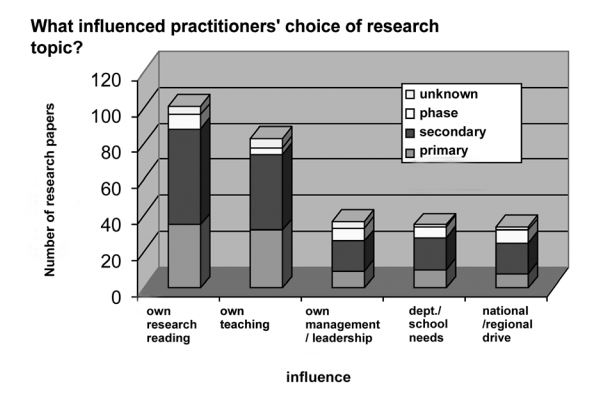
The National Teacher Research Panel has been working for some time to draw connections between teachers’ own research, their use of other people’s research and day to day CPD practices. The collaborative enquiry carried out by the panel and the Centre for the Use of Research and Evidence in Education (CUREE) (Seal et al 2008) and consultations at our biennial Teacher Research conference in 2008 are helping to illustrate these connections – and the related benefits for teachers.
The NTRP is a group of practising teachers, selected for their expertise in teacher research who work to increase the number of teachers engaged in and with the full spectrum of research activity. The Panel is sponsored by the Department for Children, Schools and Families (DCSF), the General Teaching Council (GTC), the Learning and Skills Improvement Service (LSIS) and the National College for School Leadership (NCSL). Every two years the Panel hosts a national conference at which practitioners, policy makers and colleagues from the research community come together to explore the outcomes of projects which engage teachers in and/or with research. Contributing practitioners go through a rigorous quality assurance process led by Panel members and their professional advisers, CUREE. This includes peer review of abstracts and research designs, a collaborative writing and editorial process and a workshop to help participants think about how to present their work in ways that can genuinely inform others’ thinking and practice. From its conferences the Panel has accumulated a data set which represents a body of teachers’ research questions, the ways in which they have set about answering them and the implications that they and others have identified for classroom practice, school leadership, policy and further research.
What do practitioners’ questions tell us about their CPD concerns?
Our first step in exploring connections between practitioners’ interest in research and their CPD priorities was to analyse the research aims and foci. We started by looking for patterns within the data and also for connections between patterns in the data and national priorities that might have been influencing school priorities, for example DCSF priorities and priorities that emerged from the GTC survey of teachers’ views (2006). Initially the NTRP analysed 232 titles collected from NTRP summaries, TLA stage 1 and 2 presentations and CARA summaries ➜ (dates ranged from 2004 to 2007). The primary focus for a pilot analysis was to develop a coding framework that could be used with the full set of data (i.e. complete papers rather than just titles). The initial findings from the pilot were that:
- English (including literacy) was much more commonly researched than any other curriculum subject area and maths was relatively little researched representing only 3% of the overall figure (this was later shown to be due to a primary phase bias).
- 53% of the summaries were focused on approaches to teaching and learning. (Which linked strongly with the DCSF pedagogy priority)
- 65% of the summaries had a particular curriculum focus.
- Raising achievement was only specifically mentioned in the title of 9% of studies even though this is a key government priority.
- Only 6% of studies mentioned a focus on gender in their title –This contrasted with the DCSF priorities where raising standards and narrowing attainment gaps featured strongly.
- Notwithstanding a strong policy emphasis on home- school links there was very little research in this area, possibly because of the challenges this provides for a teacher. researcher.
The main study used a coding framework resulting from this preliminary analysis to analyse a set of 106 NTRP and TLA papers (2004 to 2007). First and foremost, the full analysis confirmed that practitioner research is driven strongly by teachers’ personal professional concerns. Practitioners’ own research/reading and teaching was the primary influence on their choice of project, although a third of practitioners also claimed that other factors such as their leadership role, department and/or school needs and national or regional drives had influenced their work.
